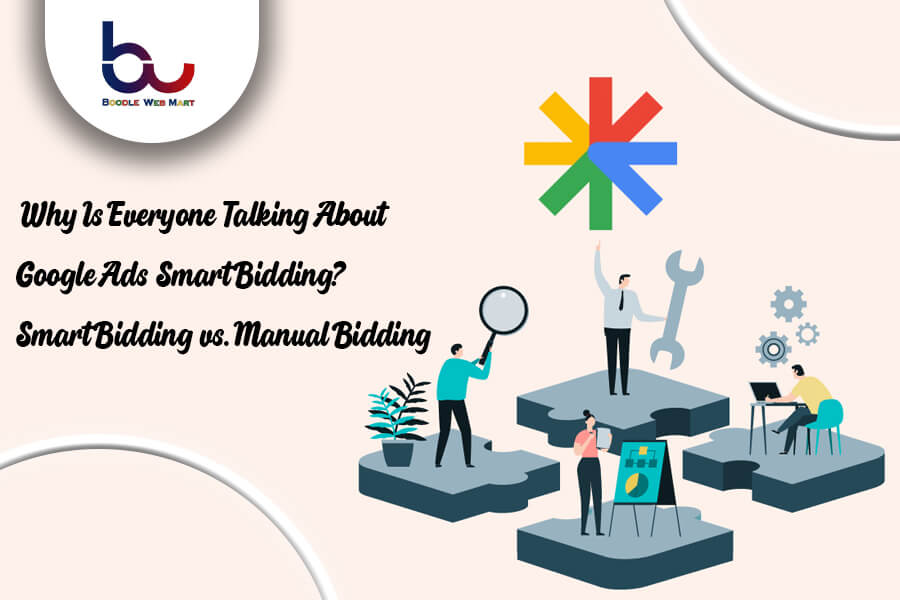Why Is Everyone Talking About Google Ads Smart Bidding? Smart Bidding vs. Manual Bidding

Digital marketing relies on Google Ads, which has transformed consumer acquisition. Exactly what is Google Ads? It lets companies run targeted advertising campaigns to promote their products or services to a specified audience. This strong instrument brings quantitative outcomes, making it essential to modern marketing.
With over 5 billion Google searches every day, there are many options to reach clients. Digital advertising in India is increasing rapidly, notably in eCommerce, thanks to Google Ads. Google Ads Smart Bidding helps here.
Google Ads’ cutting-edge Smart Bidding tool optimizes ads using artificial intelligence and machine learning to maximize budget efficiency and ROI. Let’s examine Smart Bidding and why it’s so popular in internet advertising.
What is Smart Bidding?
Google Ads offers bidding mechanisms for different marketing goals. You can choose a bidding strategy based on your campaign goals—clicks, impressions, conversions, or views.
AI and machine learning make Google Ads Smart Bidding a standout automated bidding approach. Smart Bidding intelligently adjusts bids for keywords and ad groups based on real-time parameters including user intent, device type, location, and time of day using Google’s algorithms.
The main benefit of Smart Bidding? It helps you meet advertising goals like conversions, revenue, and ROI while reducing human bid modifications. The system automates bidding, eliminates guesswork, and streamlines campaigns, saving time and effort.
Manual vs. Smart Bidding
Google Ads now prioritizes Smart Bidding, while manual bidding is still available. Differences between the two:
Manual bidding allows advertisers to fully control each bid. Manually configure each keyword’s bid to determine click or impression cost. This gives control but has major drawbacks:
Constant monitoring and bid revisions are time-consuming.
Staying current with trends, user behaviour, and keyword performance requires optimization.
Manual bids lack Google’s data and algorithms, making them less exact.
Conversely, Smart Bidding provides various advantages over manual bidding:
Automation saves time in bid adjustment.
Highly scalable for large campaigns with many keywords and ad groups.
Machine learning maximizes bid results by analyzing data and refining bid recommendations.
Why and When Should I Use Smart Bidding Instead of Manual?
Knowing when to utilize Smart Bidding or manual bidding helps boost Google Ads campaign performance. Advice to help you choose:
- Consider Smart Bidding for large campaigns with many ad groups or thousands of keywords due to its scalability.
- Smart Bidding can change bids to meet complex conversion goals like increasing sales and profit margins.
- Smart Bidding is ideal for campaigns that need real-time bid modifications due to its real-time analysis of many elements.
- Choose Manual Bidding for Smaller Campaigns: – Manual bidding may provide sufficient control for smaller campaigns.
- If you want full control over each bid, manual bidding lets you alter settings.
How Does Smart Bidding Work?
Smart Bidding automatically modifies bids based on many real-time signals. Breaking down:
- Google modifies bids based on user intent and conversion likelihood. When someone searches for a product like yours, your bid will rise to boost visibility.
- Device Type: Devices affect user behaviour. Smart Bidding can enhance bids for mobile-specific actions, which have faster decision-making processes when a user is browsing on mobile.
- Location: Google Ads will bid higher if a user is near your store, driving foot traffic.
If you offer running shoes, someone nearby may search for “best running shoes near me.” Smart Bidding raises your bid to boost your ad’s ranking in search results, increasing conversions.
Smart Bidding Strategy Types Choose One When?
Google Ads offers numerous Smart Bidding techniques for different goals:
1. To obtain conversions within a certain cost, use Target CPA to alter bids to meet your target cost per conversion.
2.Target ROAS (Return on Ad Spend) enhances advertising revenue by optimizing bids for maximum return.
3.Maximize Conversions Automated bid optimization maximizes conversions for advertisers with restricted budgets
When conversion value is more essential than volume, prioritize optimizing for high-value conversions over increasing volume.
Each strategy is designed to help you achieve certain business goals, so choose the one that best fits your campaign.
Automated v/s Smart Bidding?
Examples of Smart Bidding Success
Tripster, a travel firm, uses Smart Bidding. They sought profitable business growth. They optimized their bids in real time based on device, location, and user intent utilizing Target CPA bidding.
Smart Bidding led to a 40% boost in conversions for Tripster after six months.
-35% CPA reduction
A 25% impression share boost
Smart Bidding helps organizations develop swiftly without sacrificing revenue, as shown in this case.
Conclusion
Smart Bidding revolutionizes Google Ads campaign scaling. Businesses can optimize results with minimal manual work by automating bid revisions using real-time data and machine learning. Smart Bidding gives you the freedom and insight to boost conversions, revenue, and ROI.
Key takeaway? Optimizing and using Smart Bidding is essential to maximising your Google Ads spend.
Author Bio
Content written on behalf of BoodleMart
Do you want
more traffic?
At Boodle Web Mart we are determined to make a business grow. My only question is,
will it be yours?
Our Guides
Do you want
more traffic?
At Boodle Web Mart we are determined to make a business grow. My only question is,
will it be yours?







